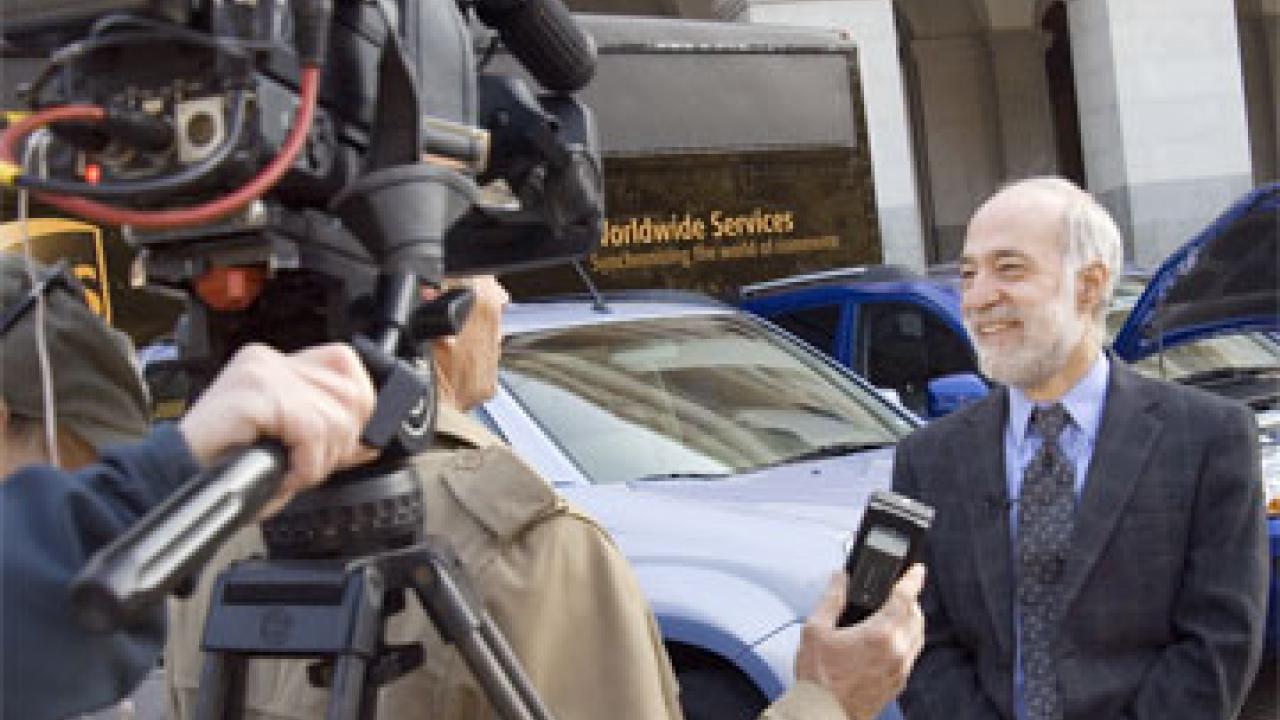What is different about California's new initiative to reduce greenhouse gas emissions from cars and trucks? This time, the target is not the vehicles -- the engines and catalytic converters, and the many pollutants they produce during combustion.
This time, the target is the fuel itself, says one of the UC Davis experts commissioned by Gov. Arnold Schwarzenegger to draft the new policy.
"It is impossible to make and burn gasoline without giving off greenhouse gases, particularly carbon dioxide," said UC Davis engineering professor Daniel Sperling, noting that transportation fuels account for 41 percent of California emissions of greenhouse gases.
"We are going to give California's fuel producers incentives to reduce those gases in the manufacture of conventional petroleum fuels and also to supply alternative fuels that produce fewer greenhouse gases."
Sperling is co-director of the small team of University of California experts charged with drafting California's new Low Carbon Fuel Standard. The team includes two other UC Davis energy experts and a co-director from UC Berkeley.
Schwarzenegger will sign the executive order for the new fuel standard today in a ceremony at the Capitol. While specifics of the standard will emerge in the next several months, Schwarzenegger has already stated its central objective: to cut the "life cycle" or "well-to-wheel" greenhouse gas emissions from transportation fuels by at least 10 percent by the year 2020.
Sperling said producers' options include: improving the efficiency of their production methods; blending petroleum fuels with biofuels like ethanol; and buying fuels and emissions credits from suppliers of cleaner "alternative" fuels such as electricity, natural gas, hydrogen and biofuels.
The intent, he says, is to create a market for greenhouse gas emissions in a way that stimulates innovation and reduces emissions in an economically efficient manner. Additional benefits of this program are increased fuel diversity, reduced oil imports and improved energy security.
Sperling is director of the UC Davis Institute of Transportation Studies (ITS-Davis) and an international authority on research and development in advanced transportation fuels and fuel technology.
For 20 years, Sperling and his colleagues have been trusted independent analysts of car and truck technologies and consumer attitudes in California, the United States and foreign countries including China, New Zealand and elsewhere. Their studies and analyses have been funded by state and federal governments, major U.S. and foreign automakers, and transportation-fuel producers and distributors.
ITS-Davis findings have deeply influenced the development of every major clean vehicle policy in California -- and history shows that where California leads in air-quality and transportation innovations, other states and nations follow.
Last week, that expertise and credibility led Schwarzenegger to ask Sperling and colleagues to draft the new regulation for implementation by the California Air Resources Board.
"Our guiding principle will be to give producers the freedom to devise their own business strategies for meeting the standard," Sperling said. "That should let them maintain their competitive edge while also accelerating investment in clean fuels."
Sperling will co-direct the drafting of the Low Carbon Fuel Standard with UC Berkeley professor Alex Farrell. Farrell is an assistant professor in the UC Berkeley Energy and Resources Group and director of UC Berkeley's new Joint Center for Transportation Sustainability Research, which brings together six Berkeley campus research groups.
Rounding out the compact team of scientists are UC Davis professors Bryan Jenkins and Joan Ogden, and several graduate students and researchers.
Jenkins is an expert in converting biomass to energy and leader of the Bioenergy Research Group at UC Davis. He also directs the California Biomass Collaborative, a mostly state-funded organization that helps coordinate industry, government, academic and environmental groups' work on biomass management and use in California.
Ogden is a UC Davis professor of environmental science and policy, and co-director of the ITS-Davis Sustainable Transportation Energy Pathways Program. Her primary research interest is technical and economic assessment of new energy technologies, especially in the areas of alternative fuels, fuel cells, renewable energy and energy conservation.
The governor's order to reduce carbon in fuels is the first major step in implementing AB 32, a landmark law passed in fall 2006 by the state Legislature. It requires California to reduce total greenhouse gas emissions from all sources, not only transportation, by one-fourth by the year 2020.
Greenhouse gases, so named because they trap heat in the Earth's atmosphere, are a major cause of global climate change.
Sperling and his co-authors are expected to draft and deliver their Low Carbon Fuel Standard to the California Air Resources Board by April, where it will then undergo public review and board revisions. The rule will take effect by 2010 at the latest.
Other states are likely to follow the lead of California, which the New York Times this week called "the nation's policy petri dish." And already the European Union is developing a similar plan to reduce carbon in vehicle fuels. It is expected that California's program will be a model for the rest of the world as well.
Media Resources
Dan Sperling, Institute of Transportation Studies, 530-752-6548, dsperling@ucdavis.edu
